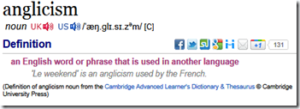 It may be a bit of a challenge to write about Anglicisms or Americanisms in the English language, although Ivan Kanič did so successfully in a previous guest post. I have gathered a few over the years that deserve to be shared, though. From a terminology perspective, Anglicisms fall into the category of term formation, often poor term formation. But what I will share below is mostly sloppy, if funny language use.
It may be a bit of a challenge to write about Anglicisms or Americanisms in the English language, although Ivan Kanič did so successfully in a previous guest post. I have gathered a few over the years that deserve to be shared, though. From a terminology perspective, Anglicisms fall into the category of term formation, often poor term formation. But what I will share below is mostly sloppy, if funny language use.
At the Microsoft subsidiary in Munich, products were “launched” even in German, which resulted in spoken statements to the extent of “Wir haben das Produkt gelaunscht.” Note that “to launch” was Germanized so that it was more easily pronounceable. One could get the impression that there are not enough ways to say “to start something” in German, as processes and such were usually “getriggert.”
 I had worked in the US for many years prior to joining the team in Munich and more than once smiled inwardly, when people essentially butchered both languages. I think it a bit more disturbing, when journalists litter their reports with Anglicisms, even if some of the words may eventually become part of the German language. On May 25, the announcer on Bayern 5, a news station that I listen to over the internet, said that due to the eruption of the Grimsvötn volcano not all flights had left airports as planned. She said something to the extent of “Airlines haben Flüge gecancelt…und Maschinen konnten den Airport nicht verlassen.“ Needless to say, there are perfectly good German words for airlines, cancel and airport.
I had worked in the US for many years prior to joining the team in Munich and more than once smiled inwardly, when people essentially butchered both languages. I think it a bit more disturbing, when journalists litter their reports with Anglicisms, even if some of the words may eventually become part of the German language. On May 25, the announcer on Bayern 5, a news station that I listen to over the internet, said that due to the eruption of the Grimsvötn volcano not all flights had left airports as planned. She said something to the extent of “Airlines haben Flüge gecancelt…und Maschinen konnten den Airport nicht verlassen.“ Needless to say, there are perfectly good German words for airlines, cancel and airport.
A relative of mine who moved to the US many decades ago and kept her German up to the best of her abilities still takes the cake, and I mean this in a loving way. Her little garden house had shifted during storm, she told me in a mix of German and English, but most notable with a wonderful Franconian accent: “Do hat da Wind mei Sched gemuvt.” Fortunately, she is not in a language profession where linguistic interferences could be the end of one’s career.